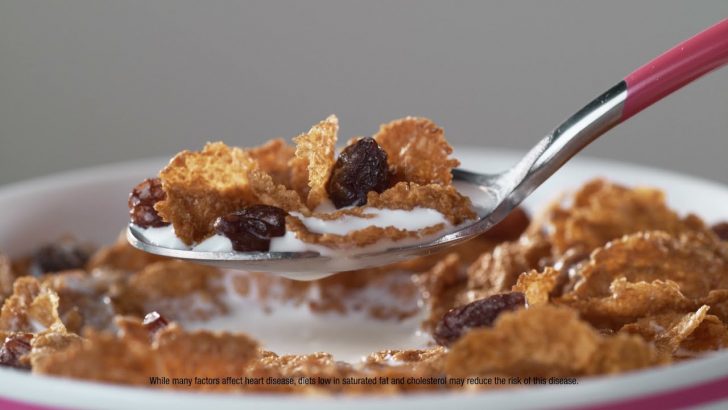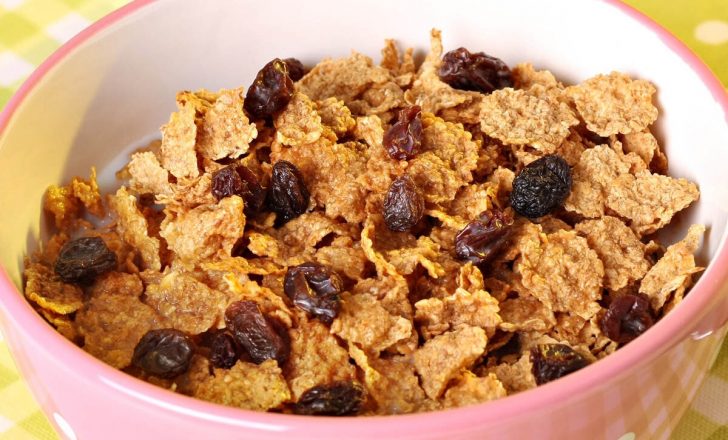Kellogg’s Raisin Bran is a classic breakfast choice that has graced many tables over the years. At first glance, Raisin Bran seems like a healthy option. After all, it is packed with whole grains and those seemingly innocent raisins. But is Raisin Bran healthy, as many people assume it to be?
Let’s break down the health benefits and downsides of this iconic breakfast cereal:
Is Raisin Bran Healthy?
To begin with, Raisin Bran is primarily composed of whole grain wheat, raisins, wheat bran, and a few other ingredients like sugar, brown sugar syrup, malt flavor, and salt. Plus, it is fortified with added vitamins and minerals, making it a nutrient-rich choice on the surface.
However, to truly determine if Raisin Bran is healthy, we need to look deeper into its nutritional profile.

YT / Each serving of Kellogg’s Raisin Bran provides a good amount of fiber and protein - thanks to the whole-grain wheat and bran.
Of course, fiber is crucial for digestive health, helping to keep things moving along smoothly in your gut. It also has a satiating effect, which means it can keep you feeling full longer.
On the other hand, protein is essential for muscle repair and growth. This makes this cereal a decent option for those looking to start their day with a balanced meal.
Raisin Bran Is Calorie-Dense
At around 190 calories per serving, Raisin Bran is fairly calorie-dense. While this might not seem like much, those calories can add up quickly. Many people pour themselves a big bowl of cereal without realizing they have just doubled or tripled the serving size.
These extra calories can lead to weight gain over time, especially if you consume them regularly without tracking your daily caloric intake.
Raisin Bran Is High in Fiber!
Despite its sugar content, Raisin Bran has a redeeming quality: Its high fiber content. Fiber is known for its numerous health benefits. It aids in digestion, helps to lower cholesterol levels, and can even assist in regulating blood sugar levels.
A single serving of Raisin Bran contains about 7 grams of fiber—something that is about 28% of the daily recommended intake for most adults.
High in Sugar
Is Raisin Bran healthy? One of the biggest downsides of Kellogg’s Raisin Bran is its sugar content. With about 18 grams of sugar per serving, it is higher than you might expect from a cereal that is marketed as a healthy choice. Much of this sugar comes from the raisins, which are naturally sweet, but some of it is added sugar.

Guides / High sugar consumption is linked to various health issues like weight gain, increased risk of heart disease, and type 2 diabetes. And that is one of the major downsides of Kellogg’s Raisin Bran.
So, if you are eating Raisin Bran daily, the sugar can quickly add up, potentially pushing you over the recommended daily limit of added sugars. This is something to seriously consider.
The Micronutrient Boost Is a Plus
Kellogg’s Raisin Bran is fortified with various vitamins and minerals, including iron, folic acid, and B vitamins. These nutrients are essential for overall health, supporting everything from energy production to red blood cell formation. The added iron is particularly beneficial for those who may be at risk of anemia, such as women of childbearing age.
However, while these added nutrients can be beneficial, it is worth noting that getting your vitamins and minerals from whole foods rather than fortified cereals is generally the better option. Whole foods provide these nutrients in their natural form, along with other beneficial compounds like antioxidants that you will not find in a fortified cereal.








